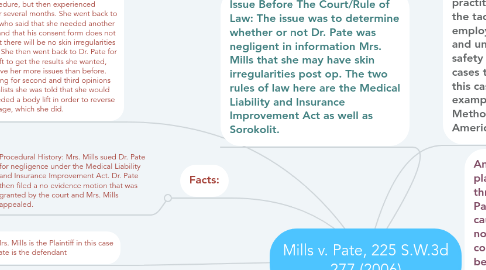Mills v. Pate, 225 S.W.3d 277 (2006)
by alex montgomery

1. Parties: Mrs. Mills is the Plaintiff in this case and Dr. Pate is the defendant
2. What Happened: Mrs. Mills went to have liposuction done by Dr. Pate in order to have fat removed from areas of her body. She was under the impression that there would be no sagging skin or issues after the procedure, but then experienced issues for several months. She went back to Dr. Pate who said that she needed another surgery and that his consent form does not state that there will be no skin irregularities post-op. She then went back to Dr. Pate for a thigh lift to get the results she wanted, which gave her more issues than before. After going for second and third opinions to specialists she was told that she would have needed a body lift in order to reverse the damage, which she did.
3. Facts:
3.1. Procedural History: Mrs. Mills sued Dr. Pate for negligence under the Medical Liability and Insurance Improvement Act. Dr. Pate then filed a no evidence motion that was granted by the court and Mrs. Mills appealed.
4. Issue Before The Court/Rule of Law: The issue was to determine whether or not Dr. Pate was negligent in information Mrs. Mills that she may have skin irregularities post op. The two rules of law here are the Medical Liability and Insurance Improvement Act as well as Sorokolit.
5. Impact, Importance: This case should cause healthcare providers to become very cautious about the information they give to their patients. Full disclosure is important from a business standpoint, as the reality is that nobody is perfect and a surgeon cannot change someone’s body composition as far as how they heal. Consent needs to be given, reviewed, and gone over with the patient in writing/person in order to ensure both parties are in agreeance.
6. Conclusion: The court originally upheld that Dr. Pate was not in breach of express warranty due to his informed consent that was provided to Mrs. Mills. She then appealed this decision with evidence and the court reversed their decision, believing that she had sufficient enough proof that Dr. Pate was in breach of express warranty and sent the case to trial court to further the proceedings.
7. Influence: This case urges practitioners to take caution in the tactics that they use towards employees. They cannot oversell and under-deliver as it is both a safety and health caution. Two cases that were influenced by this case and cite this as an example are Key V. Viera and Methodist Hospital vs. Zurich American Insurance Co.
8. Analysis/Application: The plaintiff Mrs. Mills argued throughout the case that Dr. Pate knew the surgery would cause irregularities and did not notify her or provide informed consent, which was not originally believed to be the case by the cour. The defendant Dr. Pate was able to show that Mrs. Mills did sign the informed consent which had different issues listed that could go wrong before and after the procedure. Mrs. Mills also said there was breach of express warranty, as she was the buyer and did not believe that the warranty of the product met the expectations that she was sold. The court eventually overturned their original ruling for Dr. Pate and agreed with Mrs. Mills that there was a breach of express warranty, due to the evidence she was able to provide later on in the case.


